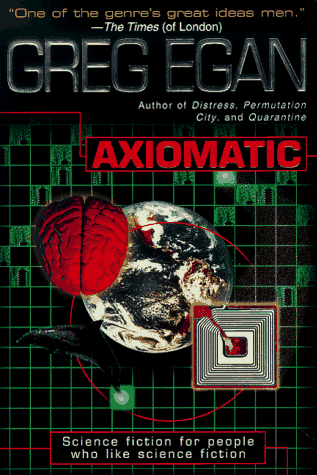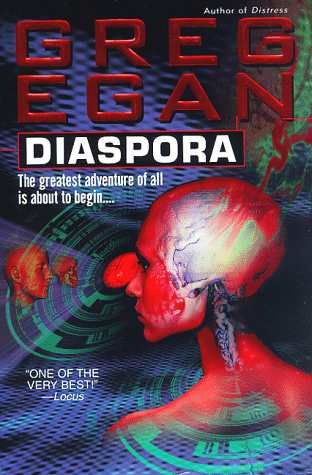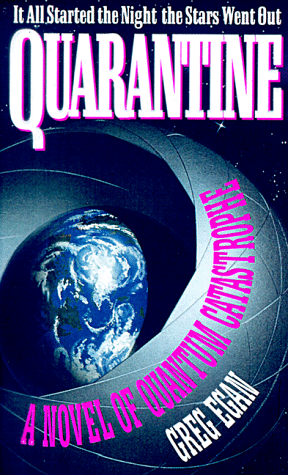





Nedster's Bookcase of Sweet, Sweet Love
Sorry to disappoint you, folks, but there won't be any sweet, sweet lovin's going on tonight. Come back tomorrow, and maybe you'll see some gettin' on. But for the moment, take a look at my bookcase of sweet, sweet love.
Greg Egan books are all so indescribably fantastic! I read Quarantine, and it struck me as slightly trashy, but then I read Permutation City, and it was so good I was unable to move or speak for days after I read it. Diaspora is a sequel to Permutation City. Axiomatic is a groovy short story collection, so is Luminous, which I can't find a picture of. The English editions of all his books have much better covers. Luminous has a foetus! Yay! We all love foetuses! Or indeed foeti. Although hopefully not too much. And the other ones have funky stuff as well. The most recent book is Teranesia, which isn't quite as mind-blowing as the others, but still great.
Quarantine is a kind of Schrodinger's cat thing. A big metal thing encircles the entire solar system. The reason for this, one discovers, is that there are aliens who live in multiple realities, and by looking at them, we collapse all these multiple realities into a single quantum state, which means that loads of aliens die. So they stop us by putting a big thing between us and them. As indeed Schrodinger's cat could do, if it made sure no one ever opened the box. There would be two cats, although one of them would be dead from the poison gas. There's a Star Trek: Voyager episode about that. Except it has ships, not cats. Anyway, the guy in the story finds out that he can collapse the quantum continuum thingy in the direction he wants. So he's very, very, very lucky. The title story in Luminous is sort of similar. In that these two students find out that there's a contradiction in the fabric of mathematics, and try to destroy it by doing lots and lots of calculations to convince space-time that one side of the contradiction doesn't exist, before some corporation discovers it and uses it to fiddle their taxes. But some aliens somewhere stop them.
Permutation City is about a guy who puts people's brains on to computers, so they can live forever. Yay! And his eventual plan is to embed the computer in space-time itself, because he's convinced that in reality patterns must form again if they are unravelled, so all the information on his big computer will find itself again in the atoms of a grain of sand or something if the computer is ever destroyed. I don't really understand it. But it does work, in the end. Yay! Diaspora is a few millenia after Permutation City. Billions of people are living in a big computer. And they do lots of interesting things. Including splitting up into polises and going away from Earth, because it gets hit by an asteroid. Thus Diaspora.
Teranesia, his new one, is involved with one of his usual topics, but I can't tell you which because you don't find out which until quite a way through the book, and I don't want to spoil it. What I can tell you is that it's a speculation on evolution. Ever read The Selfish Gene by Richard Dawkins? I haven't either, but I know the gist (living things are just idiot vessels for the genes that make them up), and in a way you could say that this takes that theory to it's logical conclusion. As I said, this isn't his best book, but it made my hurt hurt more than any other. The main idea is just so huge that it leaves big painful stretch-marks on your brain where you've tried to wrap it around the central concept. The plot is involved with this little Indian boy who lives with his scientist parents on an island in Indonesia. He leaves, grows up, and comes back when an expedition is mounted to investigate the bizarre species that have been found in neighbouring places and traced back to the island.
Greg Egan has only really ever had three ideas: loading oneself into a computer, doing crazy things with quantum states, and using technology to deliberately change one's thoughts. That's all he writes about, in various different forms. But it doesn't matter, because he's SO GOOD.
Neal Stephenson book are nearly as good as Greg Egan, and in some ways better. I read The Diamond Age first, which is the wrong one to read, because it's his worst. Read Snow Crash, then Cryptonomicon, then Interface, then Zodiac, then the Diamond Age, then before reading the Big U send it to me, because I can't find it anywhere, it being out of print, then get another copy and read that.
Snow Crash is about Hiro Protagonist (which I'm going to change my name to when I'm old) and Whitey/Y.T. Hiro Protagonist is a hacker/samurai/pizza delivery guy, and Y.T. is a schoolgirl/courier type. It's set in the near future, but there are hints of satire (the largest pizza company being Costa Nostra Pizza, who kill you if you don't deliver your pizza in time, as proven by the LED built into each box). Anyway, Snow Crash is a virus. The idea is that language is more powerful than just being a method of communication. If you know how to use it, and know how to get into people's heads, you can do whatever you want. So Snow Crash is essentially some text, and if you read it, your mind goes blank. Except here it's in binary code, which only programmers know, so only they die. And also there's a guy called Raven, who has a nuke in his chest.
The Diamond Age is about a guy called Hackworth. Who does things. Specifically, he builds stuff with weird nanomachines. Including a book. It's supposed to be a book to educate this rich guy's daughter, but an orphan girl called Nell gets it. And it's really cool. The book's based around the story of these three animals, but it reacts to what the reader does, and slips stuff like martial arts training and mathematical principles into the narrative. And it's really cool. And there's also this woman who does voices for virtual reality (because they can't get computers to simulate voices properly), and she starts doing the voices for this book, and based on what she's told to say she works out what's happening to Nell. And does stuff.
Zodiac is an 'ecothriller', alledgedly. There's a guy called S.T., who has a speedboat called a Zodiac. And he does things. Some of which involves picketing big polluting companies, and some of which involves talking about all the inorganic toxins he's being forced to ingest, and some of which involves uncovering this Satanic cult, which then turns out not to be a real Satanic cult, and some of which involves investigating these weird PCBs he's found in a river. And it's very cool.
Interface is great. A state governor called William A. Cozzano has a convenient stroke just after he starts his presidential campaign. He gets this thing put in his head, which means that his entourage of spin doctors can actually control what he says when he makes a speech, by moving little levers that have 'Devout' or 'Aggressive' at one end and 'Secular' or 'Peaceful' at the other. They work out what he has to say by getting a microcosm of the population (recruiting a representative of every single social stereotype), and giving them little videowatches. They watch his speeches, and react to what he says, and their reactions come up on this massive bank of TV screens. But, of course, there's more to it than that (huge secret organisation, global conspiracy, bla bla bla). There are loads of different threads in Interface, and they all entwine at the end in a pretty contrived and poetic fashion.
Cryptonomicon, his newest, is the longest book I've ever read, and it was definitely worth it. It's a 950 page epic set partly at the end of the Second World War and partly at the end of the Twentieth Century. It's going to be part of a series, which is slightly daunting, but I'm looking forward to it. The four main characters are Bobby Shaftoe, a Marine who travels all over Asia during the book, Lawrence Waterhouse, a brilliant cryptographer who breaks Nazi codes, Goto Dengo, a Japanese engineer, and the only modern-day character, Randy Waterhouse, a hacker who starts a data haven. You've got to be on your toes to spot every single subtle inter-weaving of the characters' lives, and you've got to be on your toes even to understand the plot. There's not much more to say, except that it's the best thing I've ever read aobut the Second World War, and the best thing I've read read about hacking, and the best thing I've ever read about cryptography, and the best thing I've ever read about pretty much everything that's in the book. Read it.
William Gibson, the man with the plan. Neuromancer is without doubt one of the most influential books of the century, in terms of the number of other books, and indeed films, TV programmes and video games that have sprouted directly from its pages. He created cyberpunk, and made hacking cool long before Kevin Mitnick and Willow.
Burning Chrome is a collection of short stories, one of which is 'Johnny Mnemonic', responsible for the film. Memorable moments include a girl who has a mental clamp placed on her by her parents so she gets nauseous whenever she touches a man, and a cool holographic dog fight game. Count Zero is completely incomprehensible, and is something to do with voodoo. Idoru is about a computer-generated personality who becomes an idol to lots of Japanese school girls. I haven't read Mona Lisa Overdrive for ages, so I can't remember what it's about. Neuromancer is about a guy. And stuff. And a girl with retractable three-inch titanium fingernails. And drugs. And a guy who goes on the Internet for so long he needs a catheter. Virtual Light is about a pair of sunglasses with little screens on the inside. I really should say more about all these books, but... I choose not to! Hah! Your life is in my hands! I could enlighten you about this fantastic cyberpunk author, but I won't! I am all powerful! Ha ha!